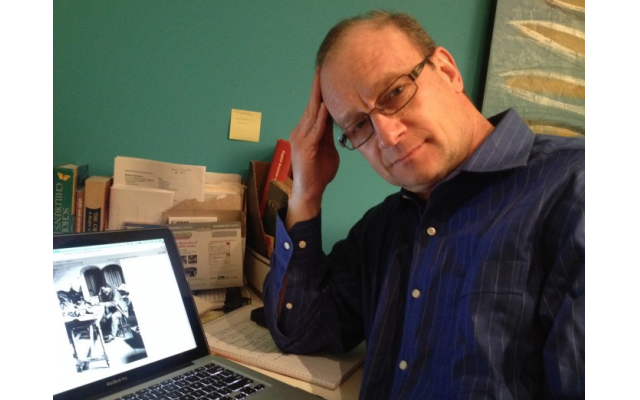A Year Later, Wounds From Pittsburgh Remain
Dave reflects on the tragedy at the Tree of Life synagogue and the attitudes of American Jews.
Dave Schechter is a veteran journalist whose career includes writing and producing reports from Israel and elsewhere in the Middle East.
While thinking about the upcoming anniversary of the massacre of 11 Shabbat morning worshippers the Tree of Life synagogue in Pittsburgh, I remembered a story from the 1972 Olympics in Munich, Germany.
Throughout his life, the sportscaster Howard Cosell had “put distance between himself and Jewishness,” author Dave Kindred wrote in a book about Cosell’s friendship with boxer Muhammad Ali. Born with the surname Cohen, in college he changed it to Cosell, closer to the family’s original name in Polish.
Now he was in Munich, not 20 miles from Dachau, site of the first Nazi concentration camp, and pro-Palestinian terrorists were holding Israeli athletes and coaches hostage in the Olympic village. “I had never felt so intensely Jewish,” Cosell said, as during the standoff between the West German government and the Black September terrorist group, who killed two Israelis in the village and later nine others during a botched airport rescue attempt.
No matter their degree of religious observance or ethnic identification, American Jews felt “intensely Jewish” on Oct. 27, 2018, as word spread that a gunman had invaded a Pittsburgh synagogue shared by three congregations and there were numerous casualties.
Pittsburgh was, I wrote, “a punch in the gut” to American Jews, a body blow that took your breath away.
Wasn’t this “die goldene medina,” the golden land (in Yiddish), the “New Jerusalem,” where Jews could worship freely, where quotas limiting the enrollment at the best colleges were a thing of the past, where discrimination in the workplace and the real estate market had been consigned to the memories of older generations? Didn’t polls show Jews to be among the most admired religious groups?
On the next Shabbat, synagogues were packed, not only by Jews (including many who rarely attended services), but also non-Jews who felt compelled to be present with their friends, neighbors and colleagues.
Never again, American Jews had vowed a year earlier, after torch-bearing, khaki-clad white supremacists marched through Charlottesville, Va., chanting “Jews will not replace us.”
Never again. That’s what American Jews declared after Pittsburgh.
Never again. That was the refrain on April 27, 2019, six months to the day after Pittsburgh, when one woman was killed and several people, including the rabbi, were wounded by a gunman at the Chabad center in Poway, California.
“Could it happen here?” has been replaced by “Will it happen again?” For anyone with a cursory knowledge of Jewish history and an awareness of present-day conditions, the real questions are when and where.
In a poll released in May by the Jewish Electorate Institute, 73 percent of 1,000 American Jews surveyed said they felt less secure than two years earlier. That is why synagogues, schools and other Jewish institutions have “hardened” their security systems, why we say “thank you” to police officers standing outside as we go inside.
On that day nearly a year ago, we were driving to Montgomery, to see the lynching memorial, when our daughter called with the breaking news from Pittsburgh.
Throughout the day, I checked my phone repeatedly, as the news worsened. Much of the drive home was taken up with conversation about how such a thing could just as easily happen in Atlanta.
Janice Rothschild Blumberg calls the Oct. 12, 1958, terrorist attack on The Temple “the bomb that healed,” for the way non-Jews rallied around Atlanta’s Jewish community, which still carried psychic wounds from the 1915 lynching of Leo Frank in what then was a wooded area of Marietta.
The Temple bombing was a response to Rabbi Jacob Rothschild’s outspoken support for the civil rights movement. Jewish support of immigration was the source of the alleged Pittsburgh gunman’s anger. “HIAS [Hebrew Immigrant Aid Society] likes to bring invaders in that kill our people. I can’t sit by and watch my people get slaughtered. Screw your optics, I’m going in,” he posted on social media.
Beyond Pittsburgh, the American Jewish community carries wounds from Oct. 27, 2018. The support from outside of the community has not been forgotten. American Jews continue to say, never again, but fear that it will, indeed, happen again.
As their yahrzeit approaches, it seems appropriate to remember names of those slain at the Tree of Life: Joyce Fienberg. Richard Gottfried. Rose Mallinger. Jerry Rabinowitz. Cecil Rosenthal and David Rosenthal (brothers). Bernice Simon and Sylvan Simon (married couple). Daniel Stein. Melvin Wax. Irving Younger.
May their memories be for a blessing.




comments